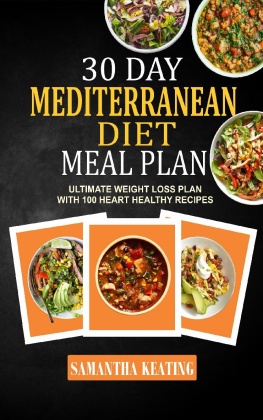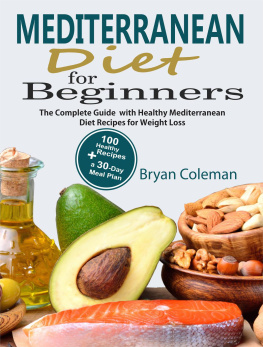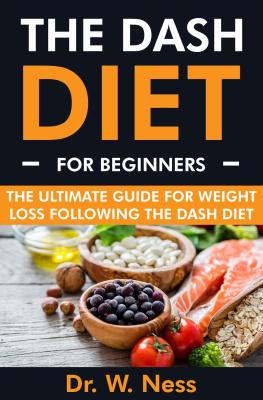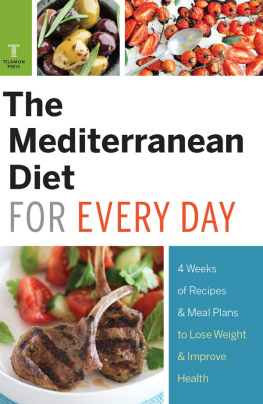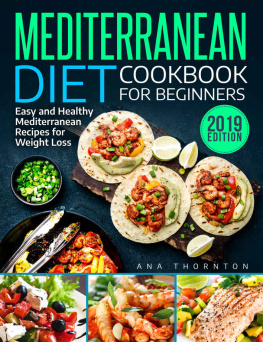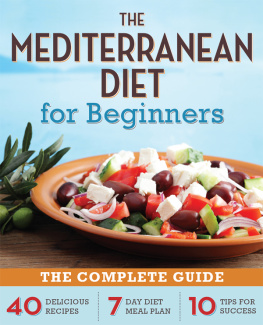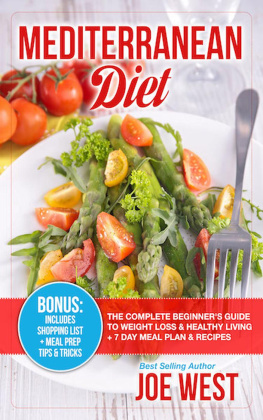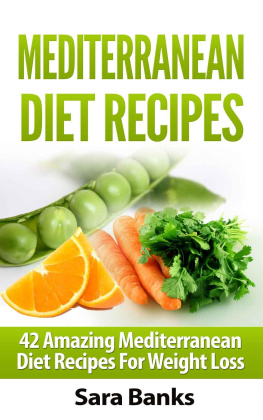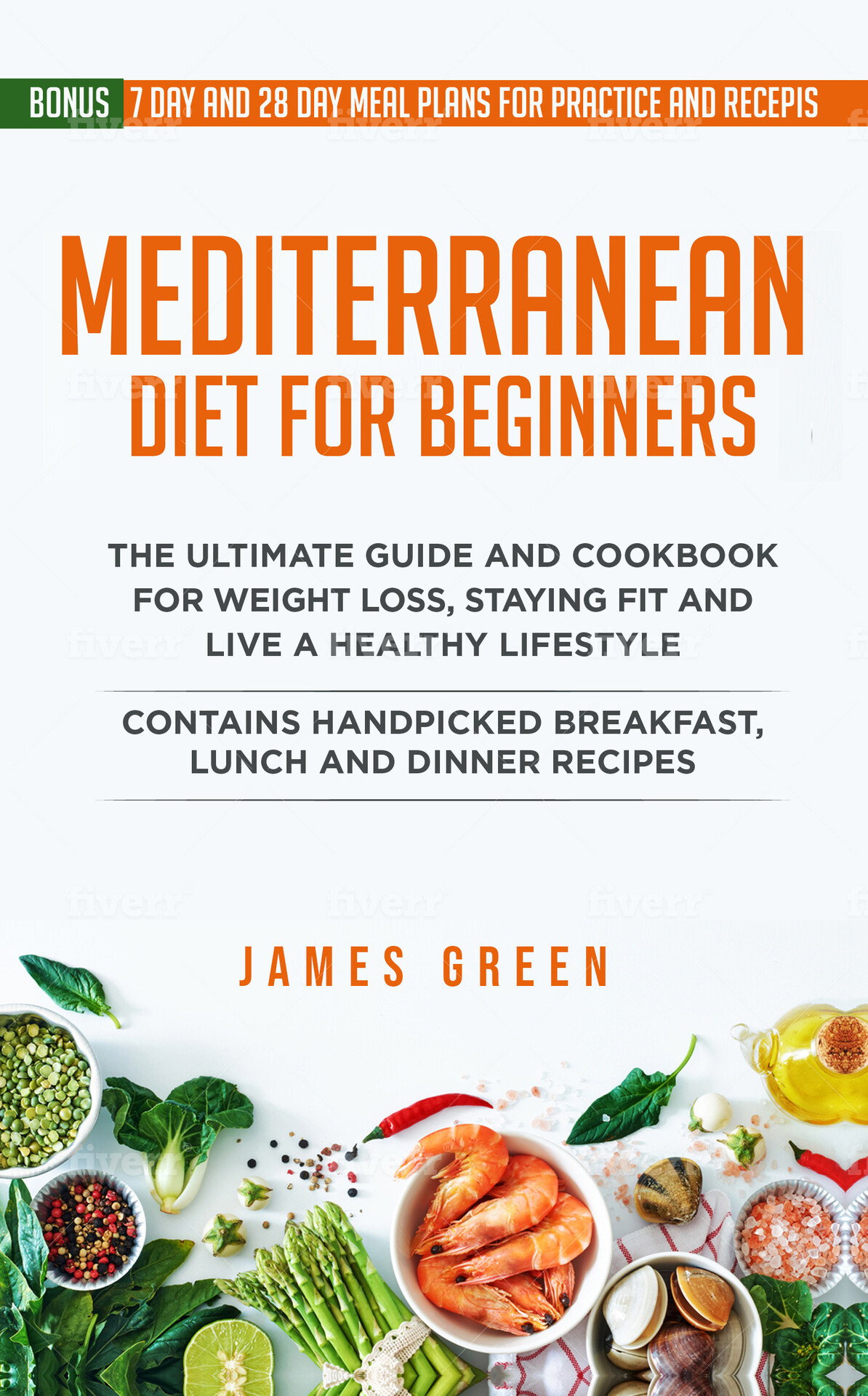Mediterranean Diet For Beginners
The ultimate guide and cookbook for weight loss, staying fit and live a healthy lifestyle.
Contains handpicked breakfast, lunch and dinner recipes (Bonus:7 day and 28 day meal plans for practice and recipes)
[JAMES GREEN]
Text Copyright [JAMES GREEN]
All rights reserved. No part of this guide may be reproduced in any form without permission in writing from the publisher except in the case of brief quotations embodied in critical articles or reviews.
Legal & Disclaimer
The information contained in this book and its contents is not designed to replace or take the place of any form of medical or professional advice; and is not meant to replace the need for independent medical, financial, legal or other professional advice or services, as may be required. The content and information in this book has been provided for educational and entertainment purposes only.
The content and information contained in this book has been compiled from sources deemed reliable, and it is accurate to the best of the Author's knowledge, information and belief. However, the Author cannot guarantee its accuracy and validity and cannot be held liable for any errors and/or omissions. Further, changes are periodically made to this book as and when needed. Where appropriate and/or necessary, you must consult a professional (including but not limited to your doctor, attorney, financial advisor or such other professional advisor) before using any of the suggested remedies, techniques, or information in this book.
Upon using the contents and information contained in this book, you agree to hold harmless the Author from and against any damages, costs, and expenses, including any legal fees potentially resulting from the application of any of the information provided by this book. This disclaimer applies to any loss, damages or injury caused by the use and application, whether directly or indirectly, of any advice or information presented, whether for breach of contract, tort, negligence, personal injury, criminal intent, or under any other cause of action.
You agree to accept all risks of using the information presented inside this book.
You agree that by continuing to read this book, where appropriate and/or necessary, you shall consult a professional (including but not limited to your doctor, attorney, or financial advisor or such other advisor as needed) before using any of the suggested remedies, techniques, or information in this book.
Table of Contents
Introduction
The Mediterranean diet does not contain a lot of red meat. Nuts are a part of a healthy part of this diet. However, one should limit themselves to a handful or so a day. Nuts are high in fat but the majority of that fat isnt saturated. Nuts are also high in calories so carefully monitor the amount you eat. Youll want to avoid salted nuts and honey roasted or candied nuts.
This diet isnt focused on limiting your total consumption of fat, instead, it focuses on making smarter choices about the kinds of fat you consume. This diet discourages people from eating trans fats and saturated fats, both of which have been linked to heart disease.
Grains used in the Mediterranean diet are preferably whole grain, which generally contain very little in the way of unhealthy trans fat. Bread is an important part of the Mediterranean lifestyle, however, the bread is not to be covered in margarine or butter. Instead, the bread is eaten either dipped in olive oil or plain. This cuts down significantly on a number of trans and saturated fats normally associated with eating bread.
Wine plays a large role in the Mediterranean diet. A glass of wine is normally included with each evening meal. Some studies show that alcohol in moderation is associated with a lower risk of heart disease. This means 5 ounces or less of wine for anyone over the age of 65 and for people under 65 no more than 10 ounces daily. If you have any history of alcohol dependency or abuse I suggest refraining altogether from consuming alcohol as part of your diet. The same goes if you already have liver or heart disease.
I often get asked how many times per week can eat certain types of foods. Well, on the Mediterranean diet you can enjoy foods like yogurt, cheese, vegetables, whole grains, beans, and fruits daily. However, fish, eggs, and meat should only be served once or twice each week. Youll find that this is easier to do than you think, especially after a couple of weeks once youve readjusted to your new way of eating. I have a ton of delicious recipes you can try out in later chapters.
The idea behind the Mediterranean diet has to do with a healthy diet comprising of low saturated fat fruits, vegetables, cereals, nuts and legumes. This also comprises of dairy products that has a low consumption rate e.g. seafood, dairy products, red meat, poultry, and little to fair amount of wine. The Mediterranean diet happens to be among the most studied dietary models.
It is observed that people in the Mediterranean area, a region made of three continents, with different culture, food habit, and tradition but live almost the same way and share in common the same eating habit. It was noticed that the Mediterranean region recorded a small number of cases related to diabetes, chronic heart diseases, cancers and gallstones.
Fresh vegetables, cereals, fruit served as desert, whole grain breads, beans, pastas legumes and nuts cooked in olive oil are mainly Mediterranean diets. You can supplement these diets with low to fair use of milk, yogurt and cheese alongside red wine or water.
You can add seafood, eggs and poultry to the diet on a weekly basis, while you limit the intake of red meat to a few times a month. Dessert and sweet consumption is also restricted to a few days a week. The best kind of dessert is fruit.
The Mediterranean diet is properly balanced with the inclusion of vital minerals, vitamins, and low in saturated salt, fat, and sugar to guarantee good health. As we know, those in the Mediterranean region live an active live, but they as well create quality time for themselves to relax, socialize and enjoy over every meal. Observing this practice assists in the digestion of food and enables the body system function properly.
One amazing thing is that, the Mediterranean diet involves foods from diets that contain a significant amount of saturated fats. To be honest, the well needed nutrition required to lessen potential health hazards is the mixture of the food products found in the diet. This also takes away the risk of gaining additional unwanted weight. For example, in the Mediterranean diet olive oil is the major source of fat. Olive oil is also a good mono saturated fat that does not boost the level of blood cholesterol. So many people have attested to the fact that a well practiced Mediterranean diet can be used to tackle heart sicknesses and to keep the body fit and healthy.
Chapter 1: What is a Mediterranean Diet
1.1) What is ..
Lets start with what the Mediterranean diet isnt: it isnt a fad diet, nor is it a diet designed to let you drop weight quickly. Often if you lose a lot of weight quickly, you regain it quickly as well. Instead, the Mediterranean diet is a lifestyle--a way of eating and enjoying food that will help you lose weight steadily and lower your risk of high blood pressure, cardiovascular disease, diabetes, stroke, and more.
1.2) The history of ..
The Mediterranean diet did not get its start in a lab. Doctors or nutritionists did not create it; it's not a fad diet or "get thin quick" diet. Instead, the Mediterranean diet is a tradition, a cultural movement--one that emphasizes rich variety, hearty and filling meals, and sustainable harvesting practices.








